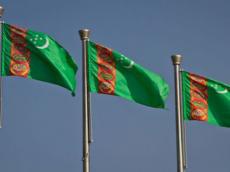|
|
TODAY.AZ / Analytics
Turkmenistan political course ask for clearance
25 March 2015 [15:00] - TODAY.AZ

/By AzerNews/
By Laman Sadigova
Europe’s growing interest and its increasing influence in Turkmenistan has acquired impressive contours.
UN Secretary General Ban Ki-moon’s statement that Turkmenistan's neutrality is an effective factor in the maintenance of security, peace and stability as well as strengthening of confidence in the region proves the growing role of Turkmenistan in the region. He also noted Turkmenistan’s active position in terms of its cooperation with the UN.
As tensions in between the EU and Russia have flared up, the EU has looked toward Central Asia to broker new deals and alliances as to create buffer zones against Moscow and bring to its side more regional powers.
And since Turkmenistan shares borders with two problematic Muslim countries -- Iran and Afghanistan -- the country has become a key geostrategic interest.
Turkmenistan is not a big fan of publishing information about its military forces and internal political situation. Thus, the EU cannot recognize the exact situation in the country and the potential threats which could arose there.
Negotiations between the U.S. and Iran on Iran’s nuclear program have yet to give results and this has generated tensions across not just the region but the world. It is important to anticipate the very possibility that negotiations will fail. Within this frame, Iran will look for alternative ways to break its blockade, and in all likelihood Tehran will turn to Middle Asia.
Energy resources, free airspace, military bases - all this make Central Asian countries alluring not only for their immediate neighbors, Russia and China, but also for Germany, EU and the U.S.
The EU's Asian ambitions and aspirations can also be understood in the light of its spat with Russia. Europe fears that Moscow will use hydrocarbon exports as an instrument of political pressure on Central Asia. And though Russia has denied it will pursue such a policy, the main topic of the talks has been to find ways to promote diversity and prevent energy dependence.
From Brussel’s point of view, joint projects on oil and gas supplies meet Central Asia’s interests.
Nevertheless, Central Asia cannot be considered as a monolithic region. These are five completely different countries with vastly different internal conditions and, most likely, with different development prospects.
Turkmenistan, for instance, has shown its desire to be closer to the EU. Perhaps, it values the perspective of this cooperation more that other countries in the region. Despite Turkmenistan’s well known neutrality, the preservation of this course of action in the future seems quite suspicious. Probably, it will maintain relations with Europe in order to secretly diversify its dependence on Russia.
However, it will be hard to keep its neutrality after making such alliances. Moreover, the talks about creating the "energy union" by the European Commission can push Turkmenistan to the EU, attracted by its possible increasing energy influence in this project.
It seems like Turkmenistan’s neutrality lost its relevance.
URL: http://www.today.az/news/analytics/139392.html
 Print version
Print version
Connect with us. Get latest news and updates.
See Also
- 11 December 2025 [14:00]
Azerbaijan’s patience pays off as 907 Amendment nears its end - 11 December 2025 [08:30]
Emerson experts highlight how robotics transforming corrosion monitoring - 10 December 2025 [14:23]
Garabagh emerges as new investment hub ahead of major forum - 07 December 2025 [15:27]
Kocharyan’s reckless rhetoric exposes real enemy of Armenia’s future - 04 December 2025 [20:43]
Yerevan’s narrative on detainees masks domestic politics [OPINION] - 04 December 2025 [08:30]
Azerbaijan unveils AI platform in bid to become Caucasus innovation hub - 03 December 2025 [19:50]
Baku’s strategic patience ends Minsk Group era, rewrites regional power dynamics - 01 December 2025 [13:58]
Baku positions itself as regional digital hub through WTDC-25 - 29 November 2025 [08:30]
Banking sector strengthens as capital, credit and digitalization advance - 28 November 2025 [08:30]
President Aliyev places industry and innovation at centre of economic reform
Most Popular
 Parallel worlds of European Union and South Caucasus
Parallel worlds of European Union and South Caucasus
 The intricacies of diplomacy: why is the 3+3 meeting postponed?
The intricacies of diplomacy: why is the 3+3 meeting postponed?
 Hasty visit to Germany - what did Pashinyan lose from Merz?
Hasty visit to Germany - what did Pashinyan lose from Merz?
 President Ilham Aliyev holds one-on-one and extended meetings with Chairman of Slovak National Council
President Ilham Aliyev holds one-on-one and extended meetings with Chairman of Slovak National Council
 ICESCO Director-General to pay visit to Turkic Culture and Heritage Foundation
ICESCO Director-General to pay visit to Turkic Culture and Heritage Foundation
 President Ilham Aliyev receives UK and Northern Ireland Trade Envoy to Azerbaijan
President Ilham Aliyev receives UK and Northern Ireland Trade Envoy to Azerbaijan
 OIC Cultural Festival discusses culture of Islamic countries in digital age
OIC Cultural Festival discusses culture of Islamic countries in digital age
